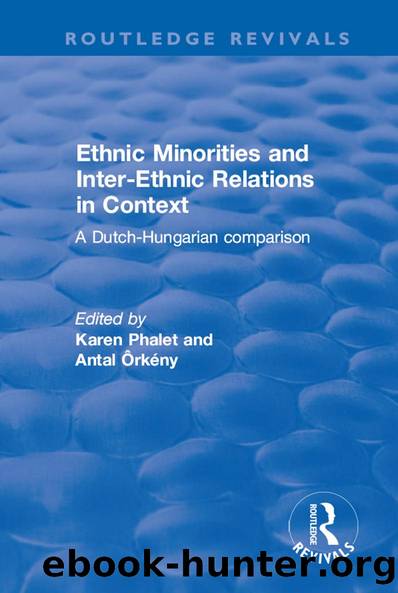Ethnic Minorities and Inter-ethnic Relations in Context by Karen Phalet Antal Orkeny

Author:Karen Phalet, Antal Orkeny [Karen Phalet, Antal Orkeny]
Language: eng
Format: epub
ISBN: 9780415793032
Barnesnoble:
Publisher: Taylor & Francis
Published: 2019-06-21T00:00:00+00:00
Results I
Using the âangle-approachâ as described above, the religious, social-psychological, and social-structural location of prejudice against Jews in the Netherlands can be derived from Figure 9.1. Take, for instance, a category label that intersects acutely with âreligiously prejudicedâ and obtusely with âreligiously unprejudicedâ. People in the corresponding social category are relatively prone to religious prejudice against Jews. And, vice versa, a category label intersecting acutely with âreligiously unprejudicedâ and obtusely with âreligiously prejudicedâ indicates that the people in that particular category tend to be relatively religiously unprejudiced against Jews. The angles for secular prejudice can be interpreted similarly.
The distinction between religious and secular prejudice appears a relevant one with respect to the religious location of prejudice against Jews. Secular prejudice against Jews is statistically independent of denomination (see above). Religious prejudice, however, is not. People not affiliated to any Christian denomination (label in Figure 9.1: nc) are apt to be relatively religiously unprejudiced. They are located in the wedge around the line for the religiously unprejudiced people. Liberal Protestants (lp) are very close to the origin and are almost perpendicular to the three categories of religious prejudice. That is, they are neither over-nor under-represented in any of the religious prejudice categories. Catholics (ca) and conservative Protestants (cp) are apt to be relatively religiously prejudiced.
For the other religious variables, church attendance and Christian worldview, the distinction between religious and secular prejudice appears to be irrelevant. People who never or hardly ever attend church (cn) and those who have a weak Christian world view or not a Christian world view at all (c-) are inclined to be relatively unprejudiced against Jews; that is, both religiously and secularly. In contrast, people who attend church about once a week (cw) and those with a strong Christian worldview (c+) are inclined to be relatively prejudiced. People who attend church once or twice a year (cy) or about once a month (cm) and those with a moderate Christian world view (cO), tend to fall somewhere in between.
As to the social-psychological location of prejudice against Jews, the distinction between religious and secular prejudice appears to be irrelevant. People with an authoritarian (au+), anomic (an+), or localistic (lo+) attitude are inclined to be relatively prejudiced against Jews, whereas those who are not authoritarian (au-), anomic (an-) or localistic (lo-) tend to be relatively unprejudiced against Jews. It seems that authoritarianism, anomie, and localism relate positively to both religious and secular prejudice against Jews.
The distinction between religious and secular prejudice appears to have bearing on the relationship between prejudice against Jews and two social-structural variables: gender and duration of residence at present address. Religious prejudice is statistically independent of gender and duration of residence at present address (see above); secular prejudice is not. Males are apt to be relatively secularly prejudiced, and females are apt to be relatively secularly unprejudiced. People who have lived at their present address for 16 years or longer tend to be relatively secularly prejudiced, whereas people who have lived at their present address for less than five years tend to be relatively secularly unprejudiced.
Download
This site does not store any files on its server. We only index and link to content provided by other sites. Please contact the content providers to delete copyright contents if any and email us, we'll remove relevant links or contents immediately.
Collaborating with Parents for Early School Success : The Achieving-Behaving-Caring Program by Stephanie H. McConaughy; Pam Kay; Julie A. Welkowitz; Kim Hewitt; Martha D. Fitzgerald(899)
Entrepreneurship Education and Training: The Issue of Effectiveness by Colette Henry Frances Hill Claire Leitch(665)
Adding Value to Policy Analysis and Advice by Claudia Scott; Karen Baehler(499)
Materializing the Middle Passage by Jane Webster;(497)
Race and American Political Development by unknow(488)
Sociological Perspectives of Health and Illness by Constantinos N. Phellas(478)
American Government and Politics Today by Steffen W. Schmidt Mack C. Shelley Barbara A. Bardes(475)
Human and Global Security : An Exploration of Terms by Peter Stoett(472)
Control Of Oil - Hardback by Kayal(465)
Advances in Child Development and Behavior, Volume 37 by Patricia J. Bauer(403)
The Disappearance of Rituals: A Topology of the Present by Byung-Chul Han(400)
The Catholic Church and European State Formation, AD 1000-1500 by Jørgen Møller(389)
The World According to China by Elizabeth C. Economy(382)
Left Is Not Woke by Susan Neiman(370)
Theories of Counseling and Psychotherapy: A Case Approach by Nancy L. Murdock(370)
Application of classical statistics, logratio transformation and multifractal approaches to delineate geochemical anomalies in the Zarshuran gold district, NW Iran by unknow(364)
Cross-Cultural Child Development for Social Workers by Lena Robinson(358)
Turkey's Relations with the West and the Turkic Republics: The Rise and Fall of the Turkish Model by Idris Bal(353)
Japan's Ainu Minority in Tokyo by Mark K. Watson(340)
